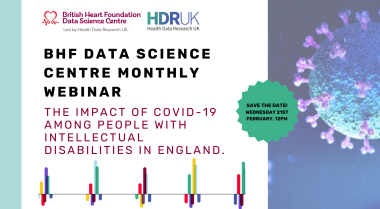The role of PPIE in enabling rapid and trustworthy access to regional health data to support COVID-19 vaccine research
10 February 2022 | Author: Judy Slape, Public Engagement and Involvement Officer
We invited members of the public to participate in a workshop to understand public perspectives in making regional, linked health data available for research use, to support vaccine safety research and to consider examples and situations that go beyond vaccine safety.
In Spring 2021, reports of blood clotting disorders associated with some COVID-19 vaccines began to emerge, especially in people under 40 years of age. To better understand these blood clotting disorders and any link to COVID-19 vaccines, several groups of researchers in the UK are currently analysing national linked datasets, including hospital admissions, primary care (GP data) and vaccination status.
However, to rapidly identify possible cases of individuals attending hospital with blood clotting disorders possibly linked to COVID-19 vaccines, researchers need access to rapid (near real-time) hospital admissions data, including laboratory test results. This kind of data is not currently available in national datasets. This data would also need to be linked to other key datasets, such as vaccine status, to carry out this research.
A group convened by the Data and Connectivity National Core Study at HDR UK are now working with three regions across England to investigate whether linked data sets available at regional level can provide information currently lacking from national data, and in a timelier fashion:
- CIPHA, which is based in Liverpool
- Barts Health NHS Trust, which is based in East London
- PIONEER, which is based in Birmingham
Involving the public has been a crucial element of this work to make sure they are comfortable with their routinely collected health data being made available for research in this way, and to make sure the research and future data infrastructure is developed in a way that that retains the trust of the public.
How were patients and the public involved?
We invited 18 members of the public to participate in a workshop to understand public perspectives in making regional, linked health data available for research use, to support vaccine safety research.
We established a working group of PPIE leads from the three regional organisations, as well as from HDR UK and a lay representative to collaboratively design the workshop and write a ‘pre-read’ to send to participants ahead of the workshop to build capacity and understanding of the project. Including a lay representative helped make sure the workshop design and materials would be appropriate and accessible for the public.
After a short introductory session, attendees were divided into three breakout rooms based on their location relevant to the three regional organisations. Each breakout room had a researcher, acting as a ‘content lead’ to answer technical questions, as well as an expert PPIE facilitator.
The breakout room facilitators each asked the same questions:
- What are your initial reactions to this work?
- What do you need to know to be confident that the work is transparent, secure and trustworthy?
- What do you think about anonymised datasets being made available to researchers outside the region?
- What organisations would you be comfortable/uncomfortable with accessing this data?
- What do you think about additional data linkages from national data sets (such as vaccination status data) being made to routine health data which is held about you regionally to support this project and other urgent pandemic research?
- Uses of the data beyond a Covid focus? E.g., complications of new drugs, rapid assessment of new diseases or infections
What did patients and the public tell us?
“I welcomed the chance to provide input, as a member of the public, both into preparing the workshop and participating in it. I was impressed by how all shades of opinion were welcomed by the researchers in a genuine desire to ensure the public voice matters, which resulted in an excellent exercise to bring those health benefits to patients.” Alan Keys, (HDR UK lay representative)
The workshop identified three main themes that were most important to the public.
- Firstly the baseline for acceptability is that all research, data access, linking and sharing must be for the benefit of patients and the public.
- The role of the patient/public was also discussed in detail and in particular how much responsibility is with patients and the public to be actively seeking to find out about how their data is being used, or if researchers need to be providing that information more clearly.
- Finally there were no concerns around additional data linkages from national data sets being made to routine health data to support this project and other urgent pandemic research.
What was the impact of involving patients and the public?
The views and insights gathered from the workshop resulted in the following recommendations:
- There was strong support and keen interest for this project and for the work to be scaled up, as long as the benefits to the public, NHS and researchers are clear.
- The development of the summary report and recommendation will form part of a larger proposal to scale up the data linkage, and will provide a clear basis demonstrating support from the public.
- The report will be used to help inform the regional development of Trusted Research Environments.
To read the full report please click here
HDR UK Voices is our growing network of people who want to use their voice to influence and shape our work. Join today and you’ll have the opportunity to make a difference. Our network is open to everyone who wants to get involved and have your say.



